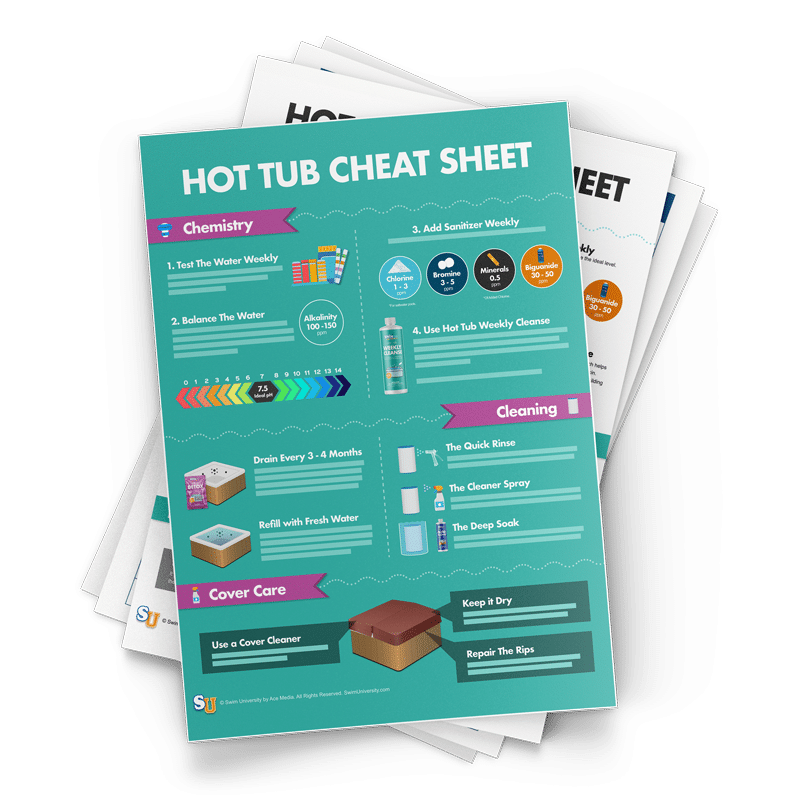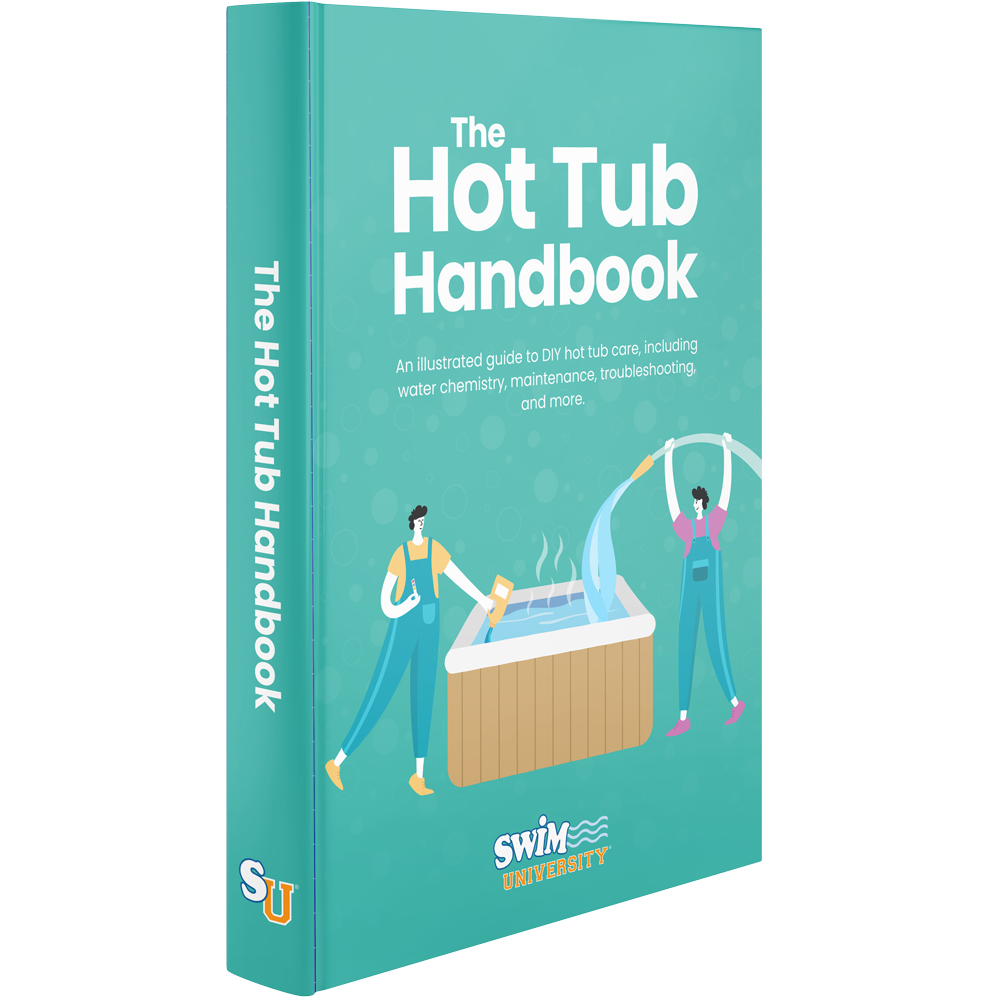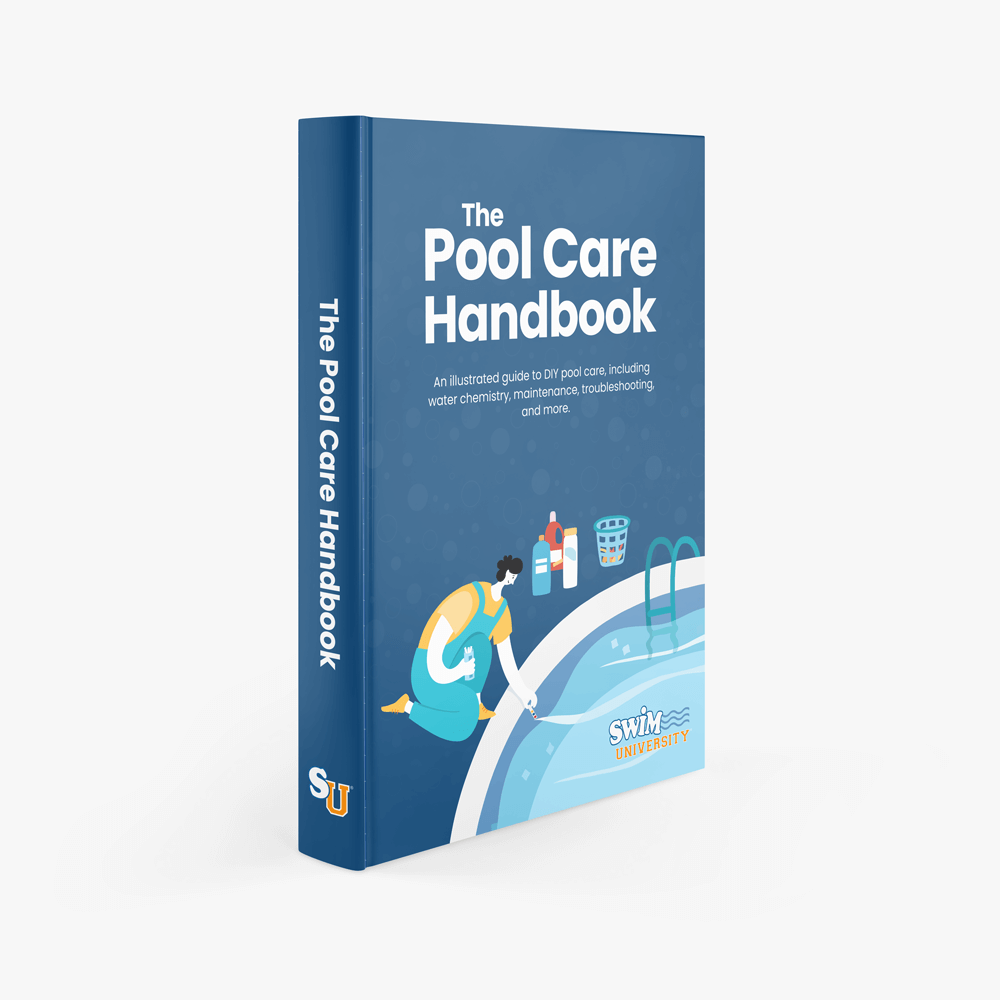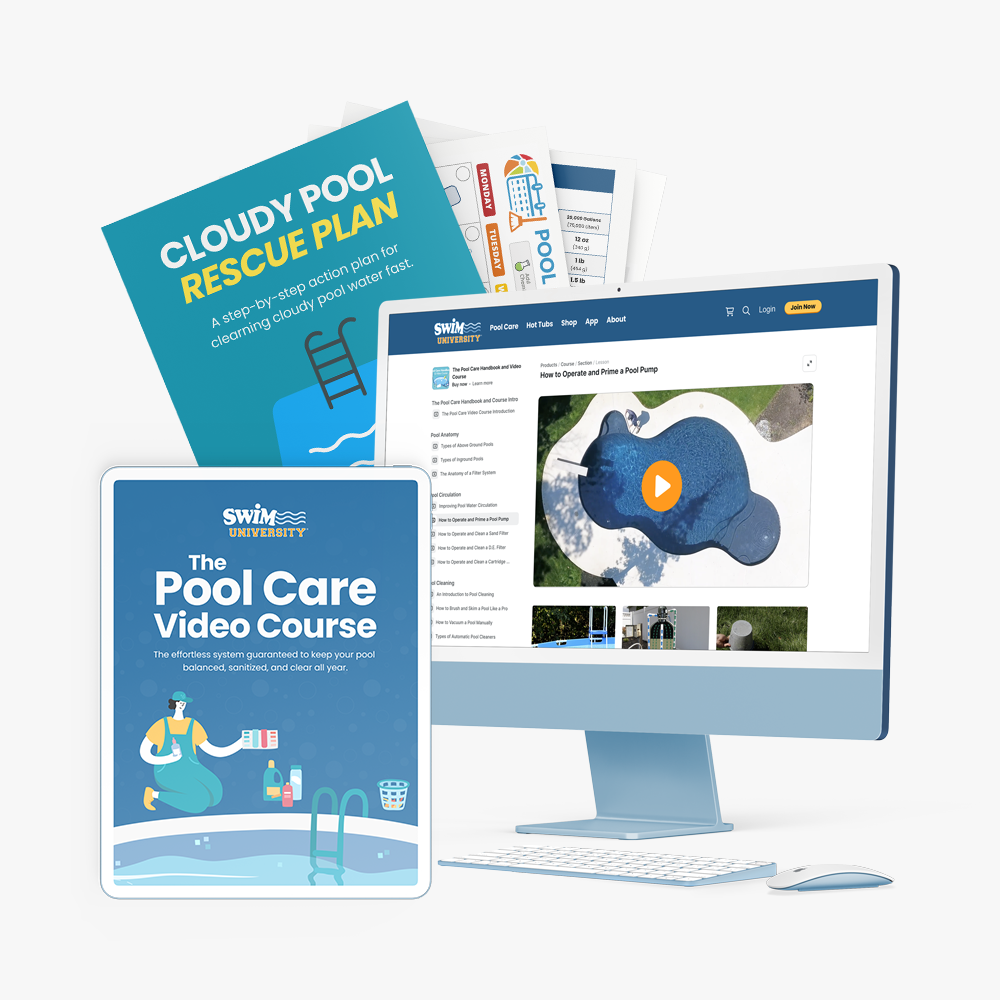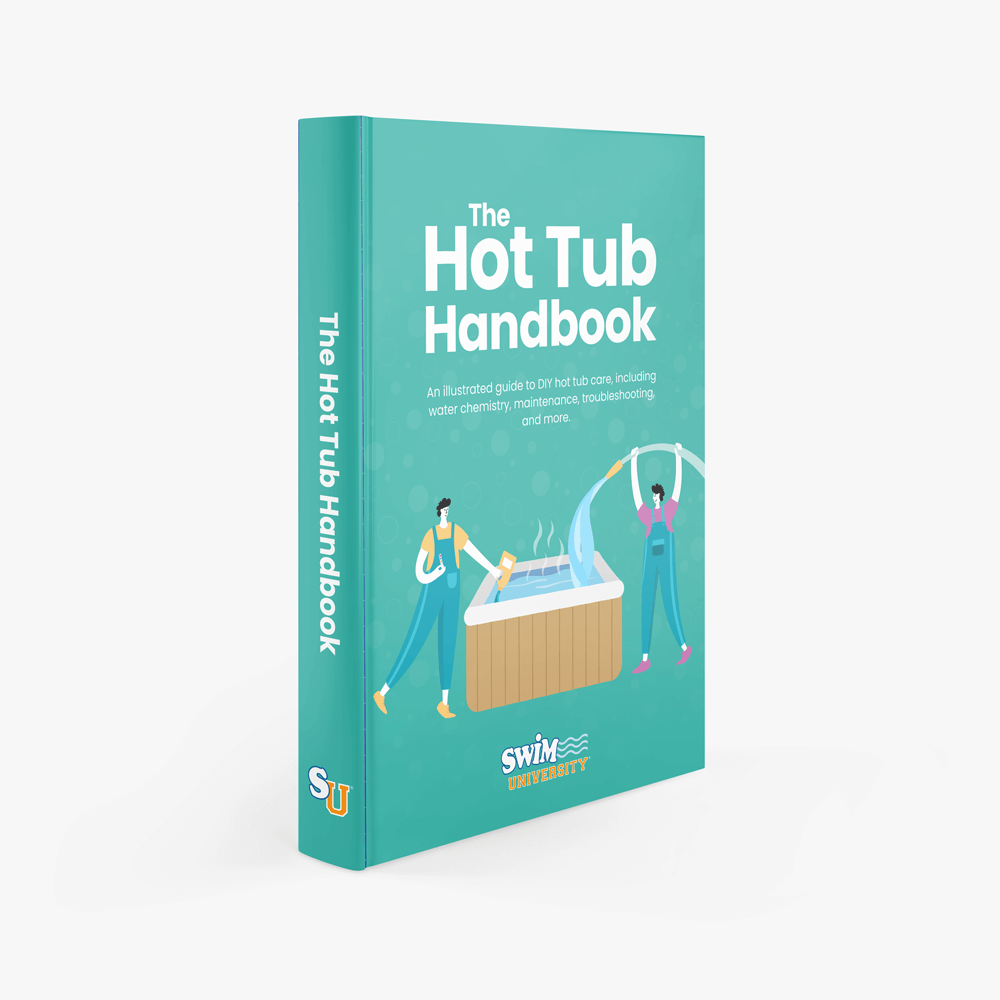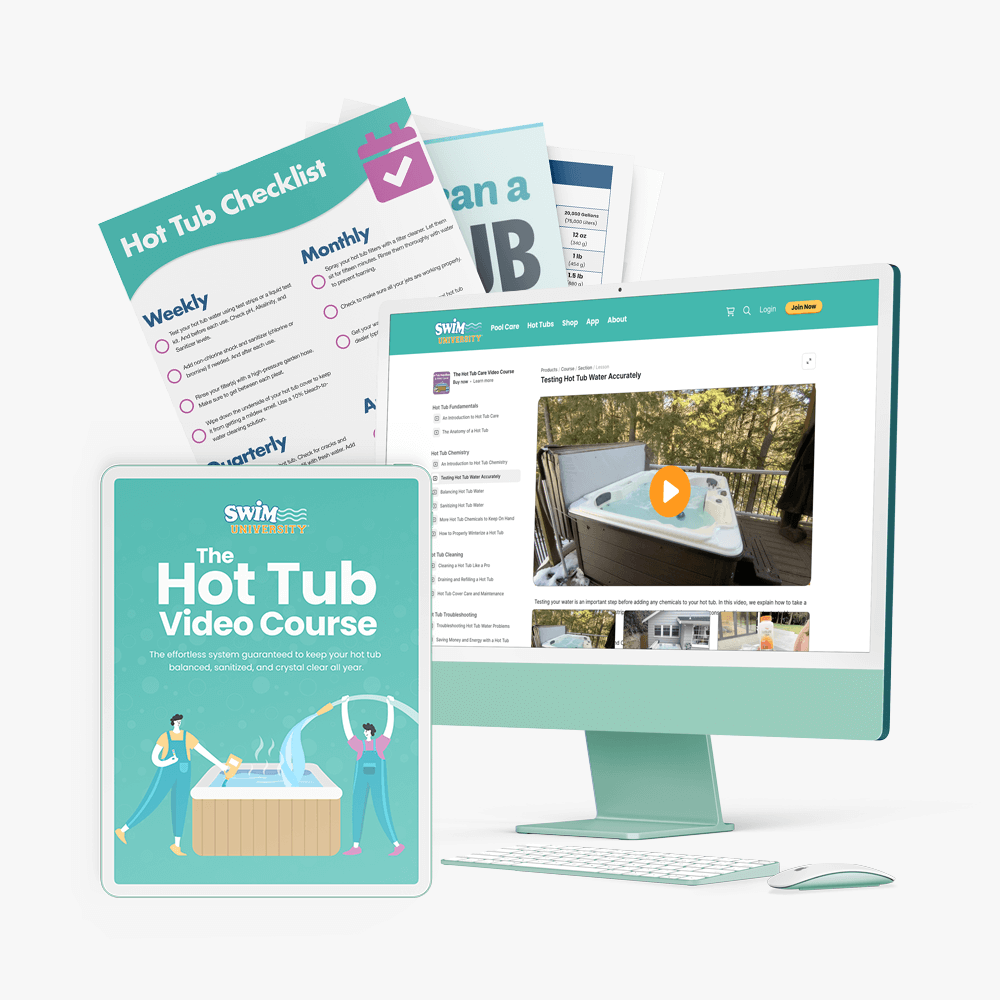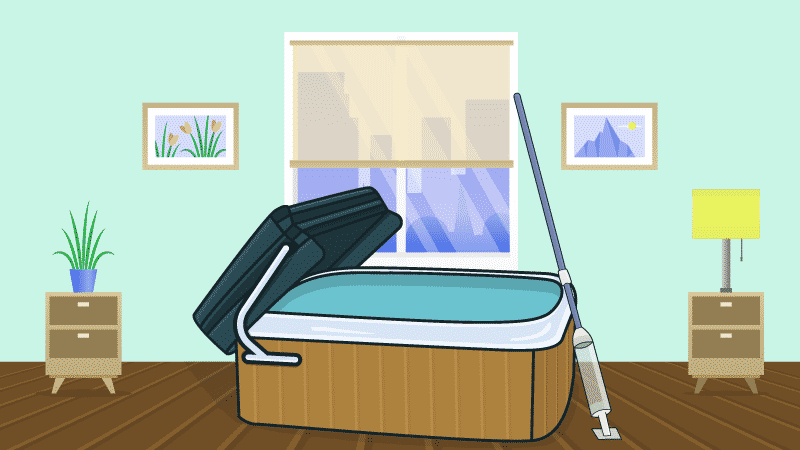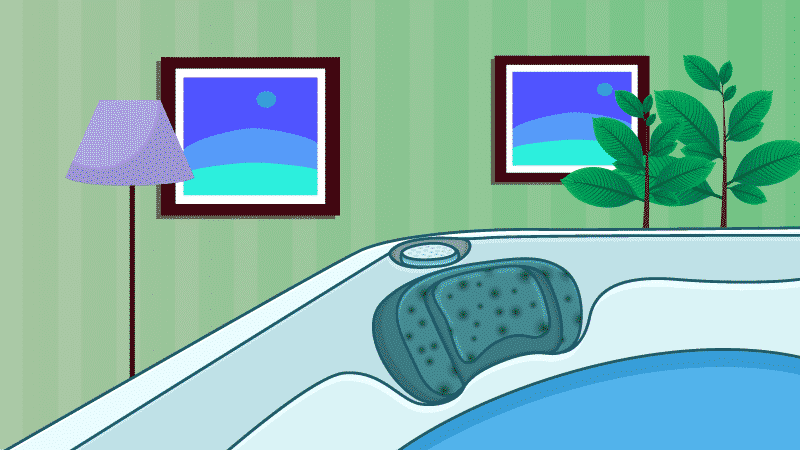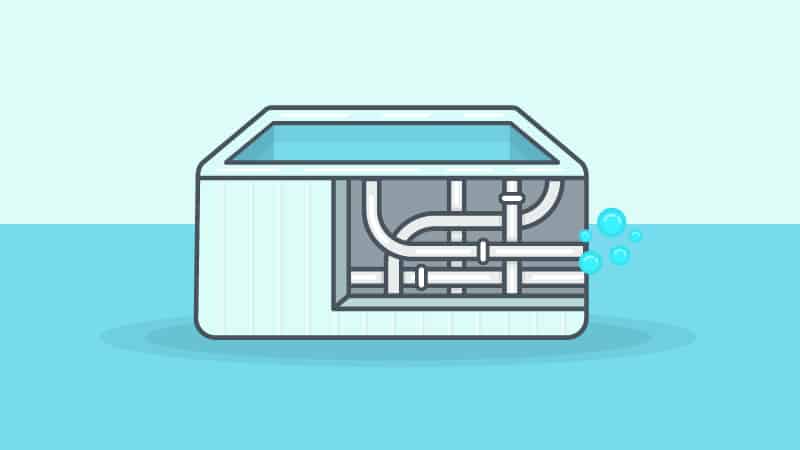A Beginner’s Guide to Hot Tub Maintenance
There are 3 Hot Tub Maintenance Rules every hot tub owner should follow. Once you learn how to manage these concepts, you can keep your hot tub clean and clear without a ton of troubleshooting.
Learn how to keep your hot tub clear while saving money so you can enjoy more soaking time without big costs. The Hot Tub Handbook covers every type of hot tub on earth.
Hot Tub Maintenance Basics
Before you sink into the warm water of your new spa, take a moment to familiarize yourself with some essential terms. For instance, you might see it referred to as a portable spa or just a spa. Some folks like to call every hot tub a “Jacuzzi.” But that’s an unfortunate case of universalizing a brand name.
Knowing the make and model of your specific hot tub is important. Having this information on hand makes it easier to get parts and services when you need them.
It also helps to have your spa’s “vital statistics” handy. These include water capacity, age, and specific water challenges (such as hard water) you might need to consider while maintaining your hot tub.
How Much Does Hot Tub Maintenance Cost?
Not much. It just requires a basic understanding of water chemistry and a simple schedule (which we’ll dive into), but it’s not expensive. All you really need is some chemicals and testing supplies, which is about a $20/month investment.
The 3 Basic Rules of Hot Tub Maintenance (The 3 Cs)
You can think of your spa as a tiny swimming pool because it requires the same basic care.
- Maintaining good water circulation.
- Stick to a simple cleaning schedule.
- Balancing your water chemistry.
1. Maintain Good Hot Tub Circulation
Circulating the water helps keep it free of contaminants by passing it through your hot tub’s cartridge filters.
Depending on the model, your spa may have an automatic circulation schedule that ensures it runs once or twice daily. These cycles circulate the water for around 15 to 20 minutes (or longer) to ensure all the water in your tub passes through the filters.
If your hot tub doesn’t have an automatic cycle, make sure you turn it on for 15 to 20 minutes, twice a day, to ensure your water’s been refreshed.
Don’t be afraid to put those filters to work. The more you run your hot tub, the cleaner it’ll be.
Pro Tip: Serve up some additional cleansing power by adding tennis balls to your hot tub after you’ve used it. The hot water extracts oils, lotions, and soap from your body and clothes, and sometimes your filters won’t be able to remove them completely. The fluffy fibers on a tennis ball will soak ’em right up, though, and help keep your water clean.
BONUS Pro Tip: Your tub’s running while you’re in it, too. When you soak is a matter of personal preference, although we don’t recommend trying it while you’re asleep or performing surgery. But you can save yourself some dough from the first time you slip into the tub by using it during off-peak hours. You’ll pay less for electricity while you keep the water moving. Plus, any would-be hot tub freeloaders will probably be busy elsewhere instead of trying to bribe their way into your backyard.
2. Stick to a Simple Hot Tub Cleaning Schedule
Cleaning your hot tub is a critical part of effective hot tub maintenance.
Indoor and outdoor hot tubs are both prone to developing scum, but if your spa’s outdoors, keep an eye out for debris like leaves, wind-blown trash, and the occasional stray critter, too. Keep the waterline and seats clear for a clean hot tub, and to help prevent potential water issues.
A weekly clean with a sponge and some white vinegar on your spa’s shell and jets will keep things tidy. Use it to scrub away the scum line at the water’s edge as well.
Can I put vinegar in my hot tub?
Yes! You can use white vinegar to clean your hot tub. White vinegar (not white WINE vinegar) is an all-purpose cleaner and is perfectly safe and effective for cleaning your hot tub. However, we recommend using a
Make sure you clean the inside of your hot tub as often as possible and don’t forget to wipe down the shell, too. While you’re at it, give the hot tub cover a quick once-over with a 10% bleach-to-water solution to keep mildew at bay.
A weekly clean is essential hot tub care. But plan to drain your spa completely for a thorough cleaning every three to four months, and more often if you’re using it often, or having a lot of guests in it, or both. After all, you wouldn’t fill the family bathtub once a year and expect everyone to reuse the same water over and over, right? Blech.
Protip: Set a timer when you’re refilling your hot tub after cleaning. It’ll remind you to check in on your spa and avoid messy, expensive overflows.
How to Clean Your Spa Filters
They’re on the job whenever your hot tub’s running, and your hot tub filters need a good cleaning to work properly. You can clean them using three methods: rinse, spray, and soak.
- Rinse your hot tub filters as often as possible with warm water or your garden hose, especially if you’ve been using your spa more than usual.
- Spray your filters every week or so with a hot tub filter cleaner to provide a deeper clean. Don’t forget to rinse them after.
- Soak your filters in chemical cleaner every time you drain and refill your hot tub to extend their life and loosen any stubborn particulates. Rinse them thoroughly afterward.
When your filters get to the point where even a chemical soak doesn’t completely clean them, it’s time to replace them.
Drain and Clean Your Hot Tub Every 3-4 Months
Since you’re dealing with a small body of water, contaminants will build up making it harder for your chemicals to work. This is called TDS or Total Dissolved Solids.
In order to combat this issue, it’s recommended you replace the water in your hot tub every 3-4 months. You should replace it more frequently if you use the hot tub a lot.
And since you have to do this anyway to keep your hot tub water in top shape, it’s also a good idea to clean in the inside and outside of your hot tub while you drain and refill it. We have an entire video and article on how to drain and clean your tub.
In a nutshell, you should add a chemical that cleans all the built-up gunk in your pipes right before you drain it. This will clean the inside of your hot tub.
3. Balance Your Hot Tub Water Chemistry
Balancing your hot tub’s water is similar to balancing pool water, but a bit trickier due to the drastic size difference. But before you add anything to your spa, you need a baseline reading on your water chemistry. Once your hot tub’s full, test your water to determine the pH and alkalinity levels.
What Hot Tub Chemicals Do You Need?
Keep a good supply of essential chemicals on hand so you’ll be ready to tweak your water as needed:
- pH increaser and pH decreaser for adjusting your pH.
- Alkalinity increaser to protect your pH from drastically changing.
- Sanitizer (chlorine or bromine) to kill bacteria and other contaminants.
- Shock (non-chlorine or di-chlor) to give your sanitizer a boost by adding oxygen and removing chloramines and bacteria.
- Test strips or a liquid test kit to make sure all your chemical levels are in the right range.
- Defoamer (optional) for quick relief from foamy hot tub water.
You can learn more about how each of these chemicals works in our Hot Tub Chemicals Guide.
Adjusting The Hot Tub pH and Alkalinity
Aim for a pH level of 7.4 to 7.6. Values below this range will be too acidic. The water might eat away at your hardware and will likely irritate your skin and eyes. Values above the range will be too basic. The water will reduce your sanitizer’s effectiveness and will be prone to cloudiness.
For alkalinity, shoot for 100 parts per million (ppm) to150 ppm. If alkalinity gets too high, it can cause scaling and cloudiness. Here’s some information on how to lower your hot tub alkalinity.
Can you use baking soda in a hot tub?
Yes! Baking soda is used to increase the alkalinity level in your hot tub. Just add 1 tablespoon (17 grams) of baking soda to your hot tub for every 100 gallons (378 liters) of water it holds.
How to Add Sanitizer to Your Hot Tub
Add the sanitizer of your choice according to the directions on the package, and test again to make sure your pH and alkalinity are within optimal ranges.
You can speed up the mix rate of your chemicals (and help your hot tub heat more quickly) by turning off the air valves.
Can I use salt in a hot tub instead of chlorine?
Yes, but only if you install a saltwater system in your hot tub to sanitize the water. And keep in mind that the saltwater is turned into chlorine by the system. So technically you’re still adding chlorine to the water but in a different form.
Shocking Your Hot Tub
If you’re using your spa after a long period of inactivity or you’ve been using it heavily, it’s a good idea to shock your hot tub to make sure it’s completely sanitized.
Make shocking a regular part of your scheduled hot tub maintenance to keep your water safe and clean.
Testing Your Spa Water
Test your water every week, either with test strips or a liquid test kit, and adjust your water chemistry as necessary.
Following the Three Cs provides a firm foundation for hot tub care that’ll get you started on that fabled path to soaking satisfaction. To further solidify your spa care regimen, add an effective and consistent hot tub maintenance schedule. You’ll expand your hot tub skills with more advanced tasks while minimizing the risk of nasty surprises.
Hot Tub Maintenance Schedule
And the key to good maintenance? Consistency and simplicity. You’ll find it’s much less stressful—and much easier to keep track of tasks—when you break the process into manageable steps that won’t overwhelm you.
This technique, known as chunking, is used by educators, project planners, and businesspeople all over the world to improve their productivity. But it’s just as effective for planning a personal project—like, say, a year’s worth of hot tub maintenance—without feeling like your head’s going to explode.
Each hot tub is different, but every hot tub benefits from simple and consistent maintenance. It’s easier than you might think to set up a schedule that’ll keep your hot tub hummin’.
Like your car, your computer, or, well, you, your hot tub needs regular maintenance to be at its best. Your spa will have its own special needs with regard to water chemistry, accessories, and repairs. But these tasks, broken out by daily, weekly, monthly, quarterly, and yearly intervals, are universal.
Daily Hot Tub Maintenance
Chances are, a few moments will be all you need to attend to your home spa’s daily maintenance. Make sure your checklist includes:
- Ensure the spa cover is clean and secure. A properly secured cover keeps heat, water, and chemicals in while keeping debris, pets, and kids out.
- Check the water temperature and adjust as necessary. Take careful note of any drastic temperature changes, as they could indicate a serious system issue.
- Check for damage to the cover and spa. This is especially important for outdoor spas, which are exposed to animals and the elements.
Weekly Hot Tub Maintenance
Adding these tasks to your list three times a week will help keep your hot tub in tip-top condition. Don’t forget to schedule them at near or the same time as daily tasks to save yourself time and stress.
- Check the water’s alkalinity.
- Check and balance the pH. Along with alkalinity, hot tub ph is one of the most important parts of hot tub chemistry.
- Check your sanitizer levels. Sanitizer keeps your spa water clean and free from bacteria that might otherwise sicken your friends and family.
- Clean above the waterline. Wipe away the debris that might contaminate the water and throw off the chemical balance.
Weekly
These tasks need your TLC only once a week. Look for opportunities to combine tasks, and don’t forget to keep careful track of your hot tub’s water chemistry for comparison to your daily and monthly values if you’re tracking potential water quality issues.
- Test your hot tub water. Every single week, check your alkalinity, pH, and sanitizer levels, and if you adjust them, test again after the period recommended by the manufacturer. NOTE: this step counts as one of your thrice-weekly checks. Yay for efficiency!
- Sanitize and shock the water. When you shock your hot tub, it recharges your sanitizer and keeps your hot tub healthy.
- Rinse your hot tub filter with water. A clean filter is worth its weight in gold and protects against cloudy water, funky smells, bacteria, and the much-dreaded algae bloom.
- Wipe down your spa cover. Cleaning the cover inside and out protects against mold, mildew, and the nasty smells they bring.
Monthly
Once a month, it’s time to get down to the nitty-gritty. Specifically, the “gritty” that’s accumulated in your jets and filters. You can also take water testing to the next level.
- Give your filter a chemical rinse. This deeper clean clears out more crud and ick than water alone can. Just replace one weekly water rinse with a chemical rinse.
- Give your hot tub jets a once-over. Are they clogged or frozen? Uh oh. It’s time to troubleshoot your hot tub jets.
- Have your spa water checked by a professional. Pros have access to more advanced testing equipment and can help you identify and solve water quality issues before they turn disastrous.
Quarterly (Every 4 Months)
Once every three or four months, you should empty the hot tub and replace it with fresh water. Empty it out, give it a good clean, and make sure everything’s in good working order. Schedule a drain and refill day that lines up with your other tasks to give yourself time to clean the cover and attend to your hardware while the spa is out of commission.
- Clean your hot tub cabinet. Your hot tub will look great with a quarterly clean, and you can touch up any cosmetic or structural damage while you’re at it.
- Give your filter a chemical soak. This is the super version of the chemical rinse and gives your filter the deep clean it needs to keep your hot tub free of contaminants.
- Drain, clean, and repair your hot tub. The best time to make repairs is when you drain and clean your hot tub. And a quarterly drain and clean frees your whole hot tub from chemical buildup and other gunk and goop that can cause performance issues. Soaking your filter while the tub is empty kills two gunky birds with one cleansing stone!
Yearly
Many of the tasks we recommend could, in theory, be done annually without significant impact on your hot tubbing experience. But for optimal performance and the happiest hot tubbing, we’ve recommended them as monthly or quarterly tasks instead.
Remember, while your hot tub is empty and drained, you can attend to weekly or quarterly tasks such as cleaning, repair, and system flushing.
That said, we recommend you tackle these tasks at least once a year, and preferably more often:
- Flush the lines to remove bacteria and biofilm. It’s actually a good idea to use line flush any time you drain and refill your hot tub.
- Inspect your hot tub’s hardware and wiring. Be on the lookout for damage due to wear and tear, pests, and chemical imbalance.
- Have a professional perform a tune-up. They’ll evaluate all your hardware and wiring for potential issues, inside and out.
- Inspect your cover. Keep an eye out for physical damage, moisture absorption, and mildew or mold infestations.
- Replace or update your hot tub maintenance calendar. As the years go by, you’ll learn what works best for you and your hot tub. The new year is the perfect time for adjustments to next year’s maintenance schedule.
3 Hot Tub Care Tips While You’re On Vacation
With just a little bit of extra work before you head out of town, you can sit back and enjoy your trip without worrying how your hot tub will handle being ignored for a week or more.
1. Check Your Local Weather
Before you head out of town, check the weather you’re gonna have in your area during the week you’re gone.
During the warm months, you have to keep a close watch on the algae growth in your hot tub. This means adding shock to the hot tub whenever you need to increase the levels of chlorine in your hot tub to kill off any potential algae growth.
Before you go out of town, go ahead and add a little extra shock to your hot tub and allow the jets to run for thirty minutes to ensure that the shock has reached all of the water. Once that is complete, turn off the jets and go ahead and turn off the heater and the pump as well.
If you want, go to the breaker and turn off the power at the source and lock it, if necessary, to make sure no one can mess with it while you are gone.
During those colder months, your concerns are a little different. When I say colder, I mean when the temperatures could drop below freezing during the day and even at night.
Depending on the time of year, your daytime temperatures could be rather pleasant while the nights can still be cold. This largely depends on where you live. No matter when it happens, if the outside temperatures drop below freezing, the water in your hot tub and the plumbing for your hot tub is at risk for freezing.
Before you head out of town, add water to your hot tub if necessary and be sure it is properly heated. Remember, the colder it is, the faster the heat will escape. Once you have it heated properly, go ahead and turn the thermostat down about ten degrees. This will save you on your heating bills while still keeping the water warm enough so it won’t freeze.
While you are gone, you will need to leave the pump and the heater on long enough to maintain these temperatures to be sure the water does not freeze.
2. Test the Water
Before you go out of town, always test the water to be sure you have the proper water balance. If you don’t, go ahead and add the appropriate chemicals to either increase the acidity or the alkalinity of your water chemistry.
This will help you maintain the hot tub and keep your plumbing in the best possible shape while you are away.
3. Lock the Cover
Never go out of town without closing and locking your hot tub cover. Keep in mind that no one will be at home while you are away and that means that kids could wander onto your property and go for a dip without you ever knowing. If something were to happen, you could still be held liable.
So close that cover and lock it tight before you set one foot out of your front door.
Owning a hot tub should never be a tether keeping you home when you could be off enjoying life. Never be afraid to take a vacation that takes you out of town, away from your hot tub.
Just remember to perform a little extra maintenance on it before you go and be sure you set the hot tub for the temperature that it is in your area, and you shouldn’t have anything to worry about. So get out there and enjoy life and quit worrying about your hot tub.
Trust me, as long as you perform the proper care tasks before you leave and check it when you get home, hot tub maintenance while on vacation will be a snap.
Happy Soaking!
3 More Ways We Can Help With Your Hot Tub
- Hot Tub Cheat Sheets (Free): Easy-to-use guides to help you keep your hot tub water balanced and sanitized.
- The Hot Tub Handbook: An illustrated guide to DIY hot tub care, including water chemistry, maintenance, troubleshooting, and more.
- The Hot Tub Care Course. You’ll get step-by-step videos and a step-by-step downloadable guide with everything you need to know about hot tub maintenance.
